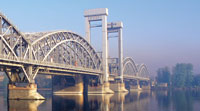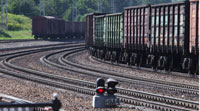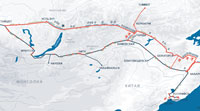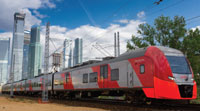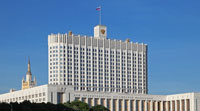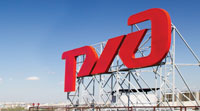Statement from Chairman of the Board of Directors

Kirill Androsov Chairman of the Board of Directors Russian Railways |
Dear Ladies and Gentlemen, The challenges and problems of the previous year presented a serious test for the corporate governance system of Russian Railways and adapting a team of a million people to the complex macroeconomic situation in Russia. Amidst the difficult conditions of economic stagnation and tariff control, Russian Railways succeeded in achieving its planned targets and demonstrating the sustainability of its chosen governance model. |
The annual results show that we had great timing in our decision to transform Russian Railways into a vertically integrated transportation and logistics group and diversify operations in order to obtain new sources of income. The Russian Railways Group is transitioning from primarily providing transportation services to the provision of world-class complex integrated logistics services. This strategy was selected above all to strengthen the market positions of the Russian Railways Group and improve its competitiveness in the transportationand logistics sector, including with respect to leading European companies.
All the conditions have currently been created to develop Russian Railways as a transportation and logistics company and work is under way to expand the line of integrated solutions to fit the customer’s needs as closely as possible. In particular, there was high demand in 2014 for end-to-end services to arrange international shipments involving several types of transportation, and we continued a large-scale project to build a network of terminal and logistics centres. The Khorvino centre started its work, the first stages were launched in Bely Rast and Doskino, and the centres were merged into a single freight train unit that runs on fixed route schedules.
According to independent estimates, the overall satisfaction level with the quality of services provided by Russian Railways in freight transportation continued to grow steadily. This growth is based on large-scale changes in transportation technology: the number of freight and container trains travelling on schedule increased, the average freight delivery speed improved and locomotive productivity ranked among the highest in the world.
Despite the objective difficulties, the pace of railway infrastructure construction did not slow down in 2014, particularly at approaches to ports. Such projects above all include the development of the Baikal-Amur and Trans-Siberian Mainlines, building approaches to the ports of the Azov and Black Seas as well as developing the Moscow Transport Hub. The Northern Latitudinal Railway and Moscow-Kazan High-Speed Railway projects are in advanced stages of development. The Development Strategy for Railway Transportation in the Russian Federation until 2030, which was updated by the Russian Ministry of Transportation, fully addresses the infrastructural development required by Russia’s railway system, which is one of the prerequisites for growth in the domestic economy.
The Company made significant achievements in the segment of rapid transit and high-speed passenger transportation, which has seen stable and growing demand among passengers. In 2014, double-decker Sapsan trains were launched and entered in the Guinness Book of Records as the longest trains in the world, while the network of the Lastochka (Desiro RUS) trains stretched from Petrozavodsk to Sochi and from Smolensk to Nizhny Novgorod. A striking example of a successful solution to complex transportation problems is the transportation service we organised for the XXII Winter Olympic Games and the XI Paralympic Winter Games in Sochi in 2014.
The Company makes extensive use of its internal reserves: it continues to develop the process approach in management involving ambitious lean manufacturing programmes, audits of the quality and safety of the transportation process and resource conservation. Future plans include introducing a new Corporate Governance Code at Russian Railways as well as improving synergies in interaction between the Company’s business units.
The Board of Directors is responsible for continuously improving the balance and long-term effectiveness of management decisions and ultimately enhancing the quality of services for our customers. This work will continue in 2015 in the interests of Russian Railways and the entire Russian economy.

